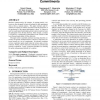Free Online Productivity Tools
i2Speak
i2Symbol
i2OCR
iTex2Img
iWeb2Print
iWeb2Shot
i2Type
iPdf2Split
iPdf2Merge
i2Bopomofo
i2Arabic
i2Style
i2Image
i2PDF
iLatex2Rtf
Sci2ools
124
click to vote
ATAL
2008
Springer
2008
Springer
Checking correctness of business contracts via commitments
Business contracts tend to be complex. In current practice, contracts are often designed by hand and adopted by their participants after, at best, a manual analysis. This paper motivates and formalizes two aspects of contract correctness from the perspective of the preferences of the agents participating in them. A contract is safe for a participant if participating in the contract would not leave the participant worse off than otherwise. More strongly, a contract is beneficial to a participant if participating in the contract would leave the participant better off than otherwise. This paper seeks to partially automate reasoning about the correctness of formally modeled business contracts. It represents contracts formally as a set of commitments. It motivates constraints on how cooperative agents might value the various states of commitments. Further, it shows that such constraints are consistent and promote cooperation. Lastly, it presents algorithms for checking the safety and guara...
ATAL 2008 | Business Contracts | Contract Correctness | Intelligent Agents | Keywords Contract Verification |
Related Content
| Added | 12 Oct 2010 |
| Updated | 12 Oct 2010 |
| Type | Conference |
| Year | 2008 |
| Where | ATAL |
| Authors | Nirmit Desai, Nanjangud C. Narendra, Munindar P. Singh |
Comments (0)

